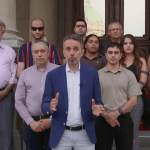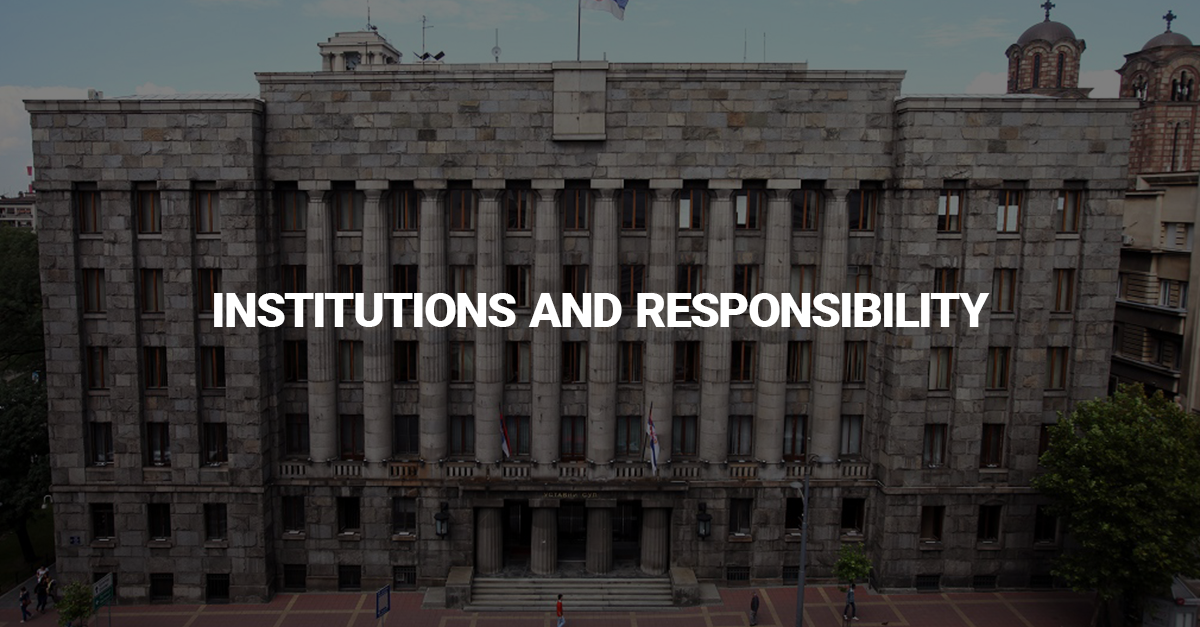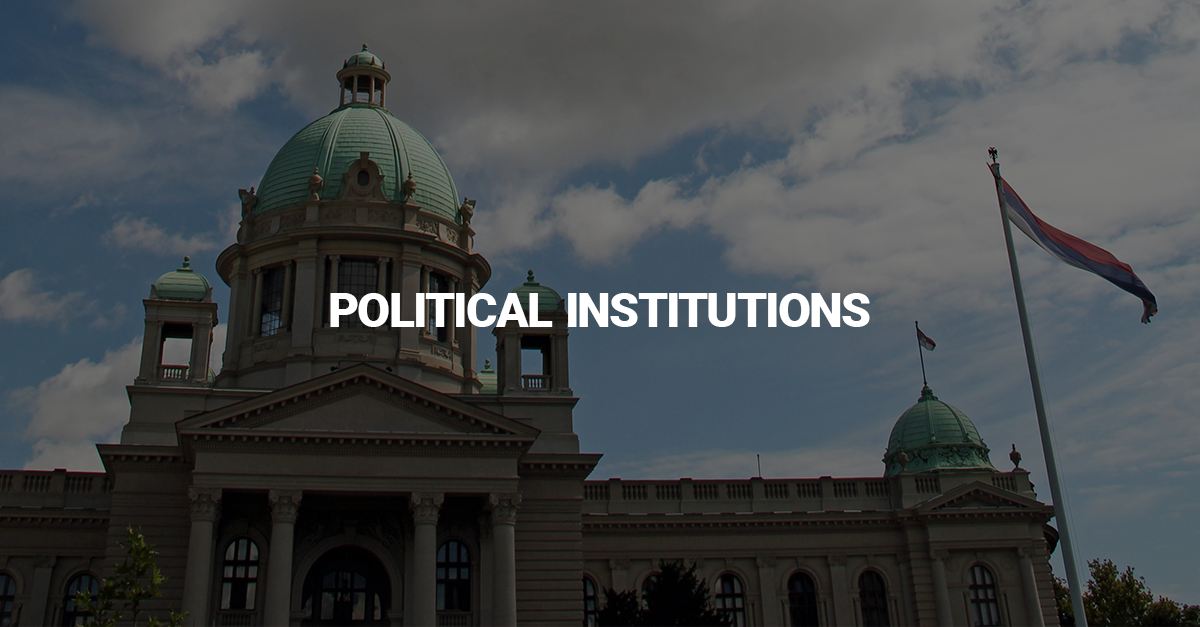Enough is enough. Restart.
What is our social interest?
INSTITUTIONS AND RESPONSIBILITY
Our aim is to create a society of free and responsible citizens. This is accomplished by creating well-regulated system based on democracy, laws and the rule of law, and governed by independent institutions. Well-regulated system is the foundation of living in equality, justice and safety, for every citizen and family, enabling them to create their happiness independently.
Human rights and civil liberties are guaranteed by the Constitution. They are the ultimate social interests. They are our political choice. They are the prism through which every action of the state government and its administration are observed. It is the prism through which the laws, also, are observed.
Legal certainty. We live in a system of devastated institutions. These institutions are not doing their job. They are ruined by partocracy. We live in an autocratic system. Politicians are interfering with their own job; nobody is controlling them; their officials have no autonomy in enforcing the law. Institutions are weak, because everybody can abuse them and bypass them. We want legal security that the independent institutions of the system can provide. The point of state agencies is the creation of independent institutions of the system, independent from politics. State officials should not be exposed to the whims of politicians who, bypassing the institutions, force them to violate the professional ethics. State officials must be dependent only on the law that prescribes their jurisdiction.
Independent and transparent judiciary purifying itself from inefficient judges and prosecutors: This can not exist without clear criteria for the evaluation of their work. It can not be achieved without the uniform and transparent judicial practice. We can not tolerate the instances in which the same judicial issue results in two completely opposite rulings, depending on who the defendant is. This breads corruption within the legal system from top to bottom. The reforms were carried out more than once, in everything except these two core issues: the criteria and jurisprudence.
Transparency: We want transparency at all levels of government and in all matters of the state; transparency as a political choice and ultimate social interest. All contracts signed by the government and state-run companies must be made public. The budget of every ministry, every agency, every state-run company, every fond, hospital and school must be accessible to any citizen 24 hours a day. Public bidding must be obligatory for all state agencies, all state companies and institutions. They must have public work plans and public reports.
Positive selection: It is in best interest of the society and all its citizens to be led by the best among us, in all social spheres – in industry, politics, education, justice, culture, health care system. Particracy devoured our society. Political parties and individual businessmen attached to them are feeding off the citizens like parasites. This is the reason why we live so hard. We must put an end to party-related employment of ignorant people and open up the space for responsible experts. If we want to achieve that, we must introduce truly open competition without political patronage wherever possible, and establish the lists of qualifications for public positions. This is the only way to create preconditions for positive selection.
Responsibility and order in state administration and state-run and public companies: We want responsible state employees, from the Prime Minister to the window clerk. We want clear criteria for the measurement of efficiency. Measurable success is the only acceptable success. Good intentions are not acceptable criteria. They are necessary, but insufficient. We can no longer tolerate Prime Ministers, Mayors or municipality officials accountable to nobody. We must not tolerate general managers of public companies who produce losses, at the same time declaring their finances to be an official secret. We do not want general managers of agencies who work in secret. We advocate the system of institutions – the so-called fourth branch of government – that would be authorized to supervise and sanction the cases of abuse in executive government. The lives of seven million people depend on the successful managing of public corporations. We must end the practice of tolerating failure and irresponsibility in governing of the state and public institutions.
Free media: media as a means of government control, not as a means of public manipulation. Not as tabloids under direct influence of political parties and various interest groups, which are creating rubbish.
In the past 13 years, irresponsibility and devastated institutions produced hundreds of thousands of unemployed. We all live harder today, because the system enables the minority to live well at the expense of majority.
HUMANE SOCIETY AND WELFARE STATE
We want a government with responsible social policies. Society without hungry people stripped off their rights, society without illiterate and uneducated, society with universal health care, offering opportunities for people to climb up the social ladder, regardless of their ethnic origin. Nobody is responsible for the circumstances in which they were born – no matter whether they were born into a rich or a poor family. Children are not to blame for their parent’s financial status, and they all deserve an equal opportunity.
Publicly financed education system. Free and high-quality primary and secondary education for all citizens, with textbooks and other expenses covered. Primary and secondary schools must provide high-quality service, which can be achieved by introducing competition between the schools. Also, free transportation for all children from villages to town schools, so that they can grow up with their peers, as well as free meals in school. On the other hand, university education should not be free, but must be accessible to everybody. Students must take responsibility for their decision to study, and for their studies. University education is supported through scholarships, but only for those who can not afford to pay for it themselves. We do not want to support the current system in which both a cleaning lady from Belgrade and a worker from Pirot pay taxes to finance free university studies for children of Belgrade surgeon.
Publicly funded health care. Free health care for all citizens, regardless of their status or employment. Free health care for all farmers, for example. The stamping of health insurance cards should belong to infamous history – everybody deserves basic health insurance, and not just those who can afford to pay for it. In order to improve competition and quality, private medical practice should provide their services on equal terms, within the same system of health care insurance. In order to have good quality health care, primary health care units, hospitals and doctors must not be exempt from the responsibility for their service, and take good care of their patients. This could be possible only if citizens have an option to ’vote’ about the quality of health care service and to change their medical staff, choosing those that fit their needs. Family physicians must be family’s choice, while primary care units, hospitals and physicians should compete for their patients with good quality service in the health care services market. Positive selection should be made by citizens-patients.
Social welfare only for those in need. If we want to have a society which helps those in need, we must stop helping those who are not in need. The current system that provides help for both those in need and those who are not, within which many can not get help just because they are missing a piece of paper, should be abolished. We must stop tolerating the practice by which people with lower income keep subsidizing people with higher income, i.e. the practice within which parents are driving their children in SUVs into the subsidized day-care nurseries, in which rich people pay subsidized electricity and gas bills and educate their children at universities with no expenses at all. Families in need of social welfare should apply for welfare painlessly, under criminal and material liability. However, there should also be random check-ups and controls, as well as strict penalties, not only in terms of jail-time, but monetary as well.
In Serbia such welfare amount could currently be 15,000.00 dinars per month per family, plus 5,000.00 dinars for each additional family member. Families with three members would receive 25,000.00 dinars. Four members families would receive 30,000.00 dinars. Currently, our welfare system annually spends 1,5 billion dinars. This should be enough to cover the welfare costs for half a million families with 1,500,000 million citizens within the universal welfare system. On the other hand, such a welfare system frees economy from any social politics. The state, not the economy, should be dealing with social policies.
Guaranteed social pensions for all citizens over the age of 65. It is not necessary to provide proof of when or how long you worked and where, nor how high your salary was per year. You don’t have to calculate the average of your best ten years. It does not matter whether you worked at all. All you need to do is present your ID, which proves that you are above 65 years of age. A state that cares for its citizens guarantees them minimal pension, even if they do not have a single year of working experience. This is a part of social welfare. That is the first cornerstone of the pension system: budget-funded pensions for all. On the other hand, those who contribute to the pension fund, whether through the second or the third cornerstone of private pension funds, will have additional economic pensions, based on the amount they paid into the funds. The current pension system is unsustainable in the long run. It serves exclusively the interests of those who receive their salaries from the state budget, and those employed in public companies. Without reforms, within twenty years, nobody will be able to live off their pension. The starting point of any reform should be the premise that the acquired rights can not be changed, which means that the reform of the pension system will in no way affect the current pensioners. It will affect their children and grandchildren.
But can we afford all this? Of course we can. However, we can not afford both this and the 15% surplus of employees in the public administration, public companies, education and health-care system, as well as, at the same time, being suffocated in rigged tenders and corruption, distorted tax system which favours rich monopolists, wasting the tax payers money on National Investment Plans, subsidized credits, subsidized employing schemes and other perpetum mobile projects that create nothing but loss. We can not have parasites who abuse the system, nor the 20% invalid pension users amongst 1.700.000 pensioners. We certainly can’t do that.
This is unsustainable. When we say that there is more than 15% surplus amongst employees in the public sector, that does not mean that we have that high a surplus of doctors. However, we do have party employees within public companies and state administration in even greater numbers. This 15% surplus within the public sector costs us over 1 billion euros per year.
MARKET ECONOMY
How can we achieve a humane and socially responsible society? Where will the money come from to finance welfare, free elementary and secondary education, the universal health-care system and guaranteed pensions? It comes from taxes, and taxes are paid by people who earn profit. The strong welfare state is impossible without a strong economy. The key element for accumulation of wealth in a society with responsible social policies is an economic system which encourages citizens to become wealthier through competition, instead of just waiting for the state to ensure their well-being.
Economic system must be based on the principles of efficiency, competition and private ownership. Socialism proved that state economy, being everybody’s and nobody’s, can not function properly. A politician, who wants to be a businessman and thinks he knows best where to invest money, should move to economic sector. He can not do it with the tax payer’s money. The economic resources will be best managed by those who own them. There is just one reason why private companies are more efficient than the state ones – they prescribe serious sanctions for neglect and irresponsibility. When a private company offers a bad product in a competitive market, buyers punish it by turning to the competition. The producer who wants to survive on the market, needs to put in more effort; if he doesn’t, he will have to close his company down. This is the basic mechanism for the assurance of growth, good quality and responsibility. If we want to have strong economy that will enable us to afford free education system, health-care system, guaranteed pensions and social welfare, such a mechanism is inevitable. Contrary to that, dominant state ownership and state run economy, as well as the politics of subsidizing chosen private companies, as we experienced during the past few decades, create poverty and misery.
We want tax system which provides state income, encourages economic growth and ensures just distribution. Taxes that suffocate economic activity should be decreased or abolished. Taxes that enable rich people to get even richer, at the expense of the poor, should be changed. The central institution that should make this possible is the Minister of Finance. Minister of Finance is not an accountant, but a person who knows which taxes are more or less harmful for the economic growth.
We want to decrease the gray economy, black market and illegitimate employment. Gray economy equals 30% of our GDP. All employers must pay all taxes and insurance contributions. All taxes must, above all, be reasonable. No tax administration is capable of ensuring the payment of unreasonable taxes. We advocate the lowering of employment taxes to the level that every employer will find it acceptable to register every employee, as well as to pay his health insurance and pension contributions.
More than 500,000 people work in micro-companies (less than 10 employees).
Significant percent of them belong to gray economy.
Around 200,000 people work in small companies (10 to 50 employees).
Significant percent of them belong to gray economy.
Around 300,000 people work in medium and big private companies.
Over 700,000 people work in the public sector and public companies.
More than 500,000 people are unregistered employees.
More than 700,000 people are unemployed.
Employer’s contributions should be lowered from 17.9% to 10%. Employee’s contributions should be lowered from 19.9% to 10%. A progressive taxing system should be introduced, with tax rates of 0%, 20%, 30% and 40%. Such a tax system would mean net salary rise for 70% of citizens. And the net pension rise for 70% of pensioners. With the decrease of gray economy and the growth of employment, the employee’s contributions would decrease to 0%.
We want regulatory reform and regulatory guillotine. Administration should be in the service of citizens and businessmen. The former established it in order to save time; the latter create new value that enables us all to live better. We want a decrease of bureaucracy: The decrease of procedures and number of documents needed to register a company, pay taxes, register an employee, install water or electricity into one’s home, get maternal compensation after giving birth, or register a newborn. Everyone’s time is precious. Citizens do not exist for bureaucracy’s sake and must not waste their time collecting documentation, certificates, permits, confirmations, and waiting in lines or waiting for a paper for months and months. Administration must have internal communication and be based on electronic government. If you submit a document in one place, you should not be asked to submit it in another ten places.
Public spending cuts. On all levels. We can only spend what we earn. Immoderate and irresponsible debiting must be stopped, because our children will be paying it off. We have no right to burden them with interest rates and credits they never agreed to. We want to abolish the ministers’ discretionary spending. Citizens know much better how to spend and distribute the money than the state and nameless state officers. We do not want to spend public income on party employment schemes, subsidies to companies that are not functioning, investors who seek privileged treatment. The results of such politics can be seen all around us.
All kinds of monopoly are bad. More or less. State monopoly is also bad. Private monopolies are much worse than the state ones. Natural resources monopolies should be governed by the state. The basis of free market economy is healthy and strong competition. If we don’t have it, the small number of people end up exploiting the rest of society.
The solution for our economic problems is neither in the industrialisation, subsidizing, state funding, nor in foreign investments. The solutions are our citizens, innovators and entrepreneurs, their ideas and efforts within an ordered, legally secure society. When the system becomes good for our citizens, foreign investors will come on their own initiative. And which branches of industry will be the future of Serbia – the businessmen themselves will show us that, once we create favourable conditions for them.
POLITICAL INSTITUTIONS
Direct elections and representatives who are directly accountable to citizens. Direct elections for mayors and municipality presidents. Direct elections for members of parliament and councilmen. The combination of majority and proportional electoral systems in the elections for members of parliament. Such a system provides greater responsibility for members of parliament and municipality presidents, as well as government and parliament consisting of fewer different parties.
Decentralization. Decision-making should be as close to citizens as possible. Local communities should get their property ownership back. Decentralization should be implemented at the district level, with strong local town centers, towards which all municipalities should gravitate. The main local elections should be held at the district level. Municipalities are parts of the district bureaucratic apparatus, with local elections for the head of municipality. Reasonable economic politics can be implemented at the district level. Having both reasonable economic policy and a huge bureaucracy with councils, councilmen, public companies and institutions on the municipality level at the same time, only leads to administration blowup. Local municipalities should also receive a considerable amount of the withholding tax income, to be able to lead their economic policy independently.


















Коментариши